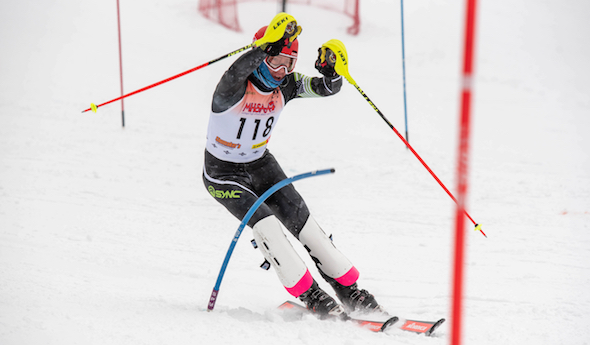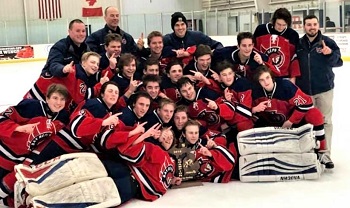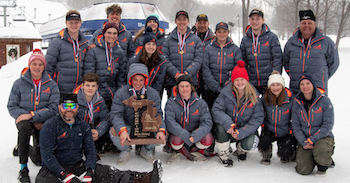
Officials Eager for New Hockey Format
July 12, 2019
By Rob Kaminski
MHSAA benchmarks editor
Tuesday, Feb. 26, was a particularly busy day on the ice as the 2019 MHSAA Ice Hockey Tournament reached just its second day around the state.
On the slate that night were 27 Regional games, bringing the two-day total to 48 on the heels of Monday’s busy calendar.
As teams were busy setting their sights on the ultimate goal, so, too, was another group of accomplished skaters who toil with much less fanfare. Nonetheless, the games can’t start without them – the folks in the striped shirts who call the games.
Just as players and coaches will welcome the expanded playoff format in 2020, the officials are looking forward to the change as well.
“When we got to the first week of the tournament, it seemed like we were going every day,” said Jim Gagleard, who assigns officials for the Livonia Ice Hockey Officials Association. “There are only so many officials to go around in any sport. By allowing us as officials a day or two to catch our breath, it’s good. Good for us, and good for players more than anything.”
If it seemed like every day, well, it was. A total of 66 games were played over the first three days, and 89 over the first four. Considering each game at the Regional level has three officials, that computes to 267 officials needed during that span. On the busiest day, 81 had to take to the ice.
Given that there were a total of 302 playoff-eligible officials in 2019, filling those slots can be a logistical nightmare for assigners at times.
“Regional week will see a huge burden alleviated for officials and especially assigners. There will be so much more flexibility under the new format,” said Dan DiCristofaro, President of the Northeast Hockey Referees Association. “Last year, we were faced with so many doubleheaders at single sites, and the first games needed an early start so that the second games would not last late into the evening on school nights.
“At times, the most important factor for the assigner was scheduling those officials who could get to the arena for the early start times. Merit and ability sometimes had to take a back seat.”
Gagleard agrees, saying, “Assigning-wise, early games are the toughest to fill. Everyone has a job, and in order to work a game they have to tell the boss they’re leaving at 2:30 for a 5 o’clock game. You start to look for officials who are retired, or can get out of work, instead of the most qualified. That’s not fair to the teams playing.”
In the northern reaches of the Upper Peninsula, the problem is more acute.
Sean Jacques is the athletic director at Calumet, and also an experienced official, having skated the Division 2 Final in Plymouth in 2016.
“Not enough,” Jacques said, in reference to the number of playoff officials in the UP. “Not enough. When I get the list of eligible officials that is sent to tournament managers, I have to search and scramble to find three people within an 80-mile radius.”
Moving the Quarterfinals to the weekend will definitely help matters, and eliminating Regional doubleheaders should ease the scheduling anxiety as well.
 “With Regionals spread out more, without doubleheaders, officials potentially could work more days,” Jacques said. “And there should be more availability for the Quarterfinals. The last few years, it was in the Sault, and getting four guys to the Sault on a weeknight, whether from Escanaba or northern lower Michigan, was difficult. There were times I’d turn down a Quarterfinal because I just couldn’t get there and back and make it to work the next day. Saturday makes it easier.”
“With Regionals spread out more, without doubleheaders, officials potentially could work more days,” Jacques said. “And there should be more availability for the Quarterfinals. The last few years, it was in the Sault, and getting four guys to the Sault on a weeknight, whether from Escanaba or northern lower Michigan, was difficult. There were times I’d turn down a Quarterfinal because I just couldn’t get there and back and make it to work the next day. Saturday makes it easier.”
On the west side of the Lower Peninsula, assigner Randy Sheahan uses a mathematical approach to illustrate his challenges, even for the regular season. Sheahan calculates that 98.88 percent of all West Michigan games are scheduled for Wednesday, Friday, or Saturday. Breaking it down further, 84.39 percent skip Wednesday and schedule only Friday or Saturday.
With the shortened regular season coming in 2019-20 to allow for a three-week tournament window, Sheahan took a proactive approach.
“When the MHSAA announced the change to a three-week tournament, I emailed all West Michigan coaches, plus a handful of athletic directors and booster leaders who may be involved in team scheduling,” Sheahan said. “I encouraged them if they are having difficulty squeezing all their games into a window which is now one week shorter, to give further consideration to playing on Mondays, Tuesdays, or Thursdays to greatly alleviate some of the stresses we place on the West Michigan officiating staff.”
As for the MHSAA Tournament, Sheahan agrees with his brethren across the state in metro Detroit that the expansion will benefit assigners, officials, and teams.
“I only see positives,” Sheahan said. “This gives me tremendous flexibility with our staff to maneuver around their professional and personal schedules to keep our best officials on the ice every round, which is an expectation teams have for playoffs. It also provides (at times) much needed rest for officials and teams, especially if they are involved in overtime affairs. This could help with the quality of overall game play.”
That’s the goal for everyone. Fresher legs for players and officials alike will provide a better experience for all involved.
“This allows for physical recovery for everyone on the ice,” said DiCristofaro. “It also allows for better time management for student-athletes, officials and coaches. Even at the Quarterfinal offerings with four officials for each game, we’d run into issues as far as which people could get to places, or wanted to travel and skate late on a work night. Saturday give us much more flexibility and should create more interest in the state tournament.”
The Quarterfinals, Semifinals and Finals have employed a four-official system in recent years, affording an extra position each game for deserving officials while adding to the quality of the game for participants at the highest level.
Sheahan plans to utilize the new format to continue to reward those among his troops who have earned their stripes for such contests.
“In theory, I may have opportunities to increase game counts for some of our perennial playoff officials, but I have no plans to do that,” Sheahan said. “We have other officials every season who are good enough to skate playoffs and have earned it, but simply couldn’t quite break the playoff bubble. Now the opportunity presents itself to reward some of those officials. It would be counterproductive to officiating development if fewer officials are getting opportunities for important games.”
Similarly, DiCristofaro is hoping the time will come when four officials will be assigned to skate Regional Finals, and perhaps the new length of the postseason will open the door.
“Some of most important games are the Regional Finals. Maybe this new schedule can help,” DiCristofaro said. “Four officials offer teams the best possible ice coverage, and they deserve that.”

Rivals Find Success in Cooperation
March 8, 2019
By Chris Dobrowolski
Special for Second Half
In the place where rivalries turn into partnerships and adversaries become teammates stands the Great North Alpine ski team and the Bay Reps hockey squad.
 The two programs — cooperatives that both include neighboring foes Traverse City St. Francis and Elk Rapids — have used that unique alliance to have great success in their respective sports this winter.
The two programs — cooperatives that both include neighboring foes Traverse City St. Francis and Elk Rapids — have used that unique alliance to have great success in their respective sports this winter.
At last week’s Division 2 Skiing Finals, Great North Alpine’s boys team captured its first title, unseating Petoskey and ending the Northmen’s state record-tying streak of eight straight championships.
The Bay Reps, which also includes athletes from Kalkaska, Kingsley, Bear Lake and Mancelona, have also reached uncharted territory this season. The Reps advanced to the Division 1 Semifinals for the first time after beating Byron Center 4-3 in overtime in Wednesday’s Quarterfinal matchup.
It might be an unlikely union, given that Elk Rapids, St. Francis and Kalkaska compete against one another in the Lake Michigan Conference for most sports, while Kingsley is a rival in the Northern Michigan Football League. However, it would be difficult for either team to exist if not for the joining of forces between multiple schools.
“That’s the main reason we look for partnerships with other schools,” said St. Francis athletic director Aaron Biggar. “A smaller school like ourselves, or even our other partners, can offer a larger array of extracurricular activities. All the athletic directors that you talk to, they understand and know that athletics and extracurricular activities are good for students and you want to provide as many opportunities for those students.”
What they’ve done with those opportunities has been special. Even before the Great North Alpine boys team captured the Finals championship this season, it had been one of the elite teams in the state in Division 2. Beating Petoskey proved to be the big challenge and resulted in three consecutive runner-up finishes to the Northmen.
 This year was different, though, and the Great North Alpine boys were able to interrupt the Northmen’s stranglehold on the crown and match the Finals championship the Great North Alpine girls won in 2016.
This year was different, though, and the Great North Alpine boys were able to interrupt the Northmen’s stranglehold on the crown and match the Finals championship the Great North Alpine girls won in 2016.
“It was a great feeling,” said Doug White, who co-coaches the Great North Alpine teams with Ben Ferris. “You felt like that monkey was finally off our back. We were able to overcome Petoskey, which was a great feat. They are a powerhouse.”
The Bay Reps have won four consecutive Northern Michigan Hockey League titles, but a postseason run this deep has eluded them in the nearly two decades since the program was formed. The Reps won Regional titles in 2002, 2003 and 2010, but were turned away in the Quarterfinals each time. This year they were able to string together four wins and break through that barrier, even though they opted to stay in Division 1 when they could have dropped to Division 2 due to fewer schools being part of the co-op (which resulted in a smaller combined enrollment).
“This year the kids are playing great, and we’re able to compete with those teams,” said first-year Bay Reps head coach Mike Matteucci. “We’ve come a long way this year. It’s been a lot of fun. A lot of growing and a lot of learning.”
Chemistry is the biggest obstacle for a co-op team, both coaches say, but they’ve found ways for team building and then meshing into a cohesive group.
“That’s something we focus on, getting the kids to work with each other,” said Matteucci. “Obviously when they get on the ice, that’s the best thing about hockey in my experience. You might go into a locker room not knowing who anyone is and you’re not going to talk much, but once you get on the ice it’s different. Everybody kind of comes together. Communicating on the ice and getting to know each other. That’s the bond that all these kids have.”
 White also has seen similar results, but in his case it’s on the ski slopes.
White also has seen similar results, but in his case it’s on the ski slopes.
“Traverse City St. Francis and Elk Rapids are rivals. It is something to overcome,” said White. “As a coach you don’t look at it that way. You just look at it as another athlete on the team. The big thing is you work on it. As the team gets together when you first start out with dry land training, that’s the most challenging then. But after you get out on the hill and start training on the hill, they come together. Everybody starts to jell together and become one.”
Along the way new friendships are established between teammates who are not always classmates or live in the same town.
“You’re usually competing against these other schools, but when you’re on the same team as them you really have the opportunity to expand your friendships across schools, and you kind of start thinking about those schools differently,” said Elk Rapids senior Finn Husband, who won the Division 2 individual slalom and giant slalom this season. “I know coming into high school I was more like, ‘Oh, these schools are my enemies. We play them in basketball. We play them (in other sports). You really root against them.’ But when you compete on the same team and you have the opportunity to understand how kids in those schools are basically doing the same thing you’re doing, you come together, you make friends and it’s an awesome time for everyone.
“I feel like I have a connection (with St. Francis), knowing the guys on the team and knowing how awesome and competitive they are.”
 Chris Dobrowolski has covered northern Lower Peninsula sports since 1999 at the Ogemaw County Herald, Alpena News, Traverse City Record-Eagle and currently as sports editor at the Antrim Kalkaska Review since 2016. He can be reached at [email protected] with story ideas for Manistee, Wexford, Missaukee, Roscommon, Ogemaw, Iosco, Alcona, Oscoda, Crawford, Kalkaska, Grand Traverse, Benzie, Leelanau, Antrim, Otsego, Montmorency, Alpena, Presque Isle, Cheboygan, Charlevoix and Emmet counties.
Chris Dobrowolski has covered northern Lower Peninsula sports since 1999 at the Ogemaw County Herald, Alpena News, Traverse City Record-Eagle and currently as sports editor at the Antrim Kalkaska Review since 2016. He can be reached at [email protected] with story ideas for Manistee, Wexford, Missaukee, Roscommon, Ogemaw, Iosco, Alcona, Oscoda, Crawford, Kalkaska, Grand Traverse, Benzie, Leelanau, Antrim, Otsego, Montmorency, Alpena, Presque Isle, Cheboygan, Charlevoix and Emmet counties.
PHOTOS: (Top) Great North Alpine’s Cooper Kerkhof – a student from Elk Rapids – helps the co-op program’s boys team to its first MHSAA Finals title last month. (Middle) The Traverse City Bay Reps hockey team celebrates its Regional title last week. (Below) Members of Great Alpine’s boys and girls teams pose with the championship trophy. (Ski photos by Sports in Motion; hockey photo courtesy of the Bay Reps program.)

